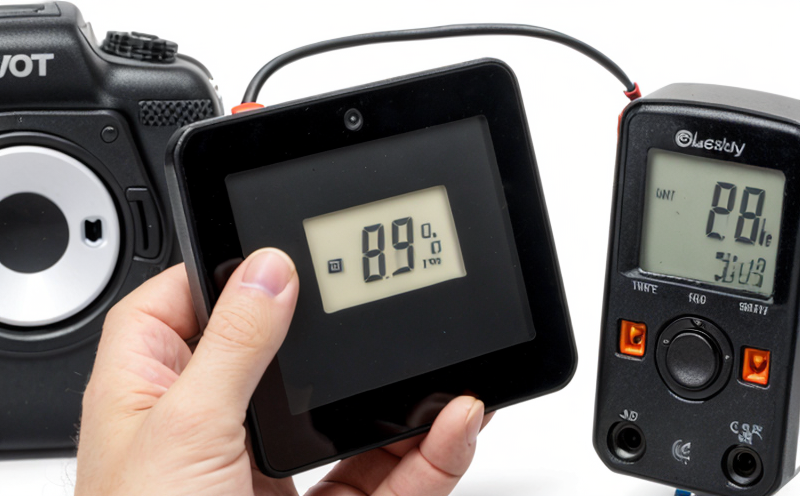Heat Dissipation Testing in Electronic Products
The importance of heat dissipation testing cannot be overstated in the electronics and small devices sector. Heat is an inevitable byproduct of electrical current flow through electronic components, and its management is critical to ensure product safety, performance longevity, and reliability.
Heat can lead to a variety of issues including shortened lifespan, reduced efficiency, and even potential failure or malfunction of the device under test (DUT). In extreme cases, excessive heat can cause damage to circuit boards, insulation materials, and other components. To mitigate these risks, rigorous testing is essential to evaluate how well an electronic product can manage and dissipate heat.
Testing typically involves exposing the DUT to a range of environmental conditions that simulate real-world usage scenarios. This includes temperature cycling, power loading tests, and stress testing under various ambient temperatures. The goal is to measure the thermal resistance (Rth) and thermal impedance (Zth) of the product. Thermal resistance quantifies the ability of the system to dissipate heat away from a hot source, while thermal impedance measures the total thermal resistance in a circuit.
The methodology for conducting these tests can vary depending on the type of DUT being evaluated. For example, smartphones and tablets require different test parameters compared to wearable devices or smart home products. However, common practices include using temperature sensors placed at strategic points within the device, such as the processor chip and battery area. These sensors provide real-time data that helps in assessing how effectively heat is being dissipated.
Once collected, this data undergoes detailed analysis using statistical tools to determine if the product meets specified safety standards. Compliance with relevant international standards like IEC 62384 for medical devices or UL 1530 for consumer electronics ensures that products are safe and reliable in terms of heat dissipation.
Understanding the thermal behavior of electronic components is crucial not only from a technical perspective but also considering environmental factors. For instance, in tropical regions where high ambient temperatures are prevalent, it's imperative to design and test products with robust cooling mechanisms such as fans or heatsinks. This ensures that even under harsh conditions, the device remains functional without compromising safety.
Furthermore, heat dissipation testing plays a significant role in product development cycles by identifying early-stage issues related to overheating risks. By incorporating thermal management strategies during the design phase, manufacturers can significantly reduce the likelihood of recalls and warranty claims associated with faulty products.
In summary, heat dissipation testing is vital for ensuring that electronic products perform safely and efficiently over their intended lifespan. It helps in identifying potential hazards early on, guiding necessary modifications to enhance product quality, and ultimately protecting end users from harm caused by overheating issues.
Why It Matters
Effective heat dissipation is paramount for the longevity and reliability of electronic products. Excessive internal temperatures can lead to premature failure or malfunctioning, which could result in significant financial losses for manufacturers and inconvenience for consumers. Properly designed thermal management solutions ensure that devices operate efficiently without compromising on safety standards.
- Enhances Product Reliability: By managing heat effectively, the overall performance of electronic products is maintained over time, reducing maintenance costs and extending product lifecycle.
- Promotes Safety Compliance: Adherence to international safety norms ensures that your products meet regulatory requirements, thereby minimizing legal risks and enhancing brand reputation.
- Improves Customer Satisfaction: Reliable performance translates into higher customer satisfaction levels, fostering loyalty among users who appreciate well-functioning electronics.
Moreover, effective heat dissipation contributes to sustainable practices by reducing energy consumption and promoting eco-friendly design choices. As global awareness around environmental impact continues to grow, incorporating advanced thermal management techniques aligns with broader industry trends towards sustainability.
Eurolab Advantages
At Eurolab, we pride ourselves on offering unparalleled expertise when it comes to heat dissipation testing for electronic products. Our comprehensive approach ensures that every aspect of your product's thermal management is thoroughly examined and optimized.
- World-Class Facilities: Equipped with the latest technology and resources, our laboratories provide a controlled environment conducive to accurate measurements.
- Experienced Professionals: Our team comprises experts who have extensive experience in various sectors, including consumer electronics, medical devices, and automotive components. Their knowledge base is invaluable for addressing complex challenges.
- Comprehensive Coverage: From initial design reviews to final compliance checks, we cover all stages of the product lifecycle with precision and care.
By partnering with Eurolab, you gain access to cutting-edge tools and methodologies that not only enhance your understanding of thermal behavior but also provide valuable input for future improvements. Our commitment to excellence guarantees that every test conducted meets or exceeds industry expectations.





